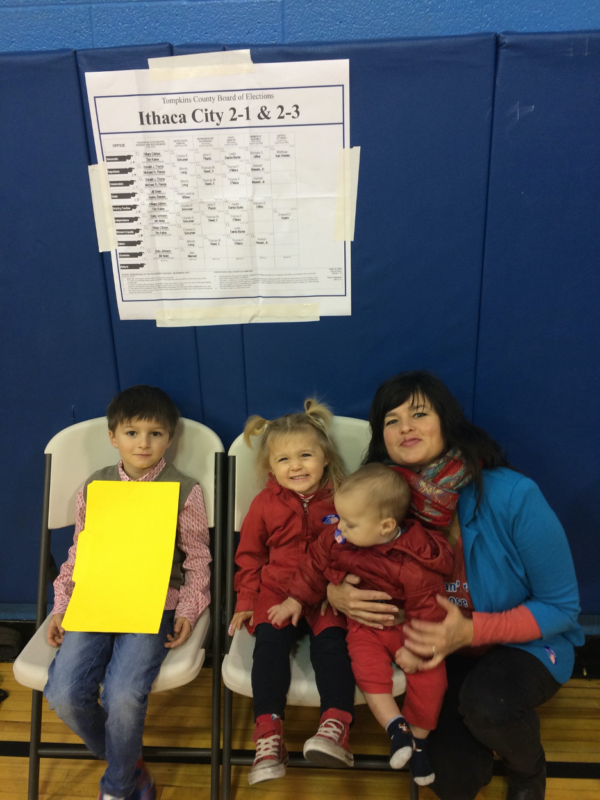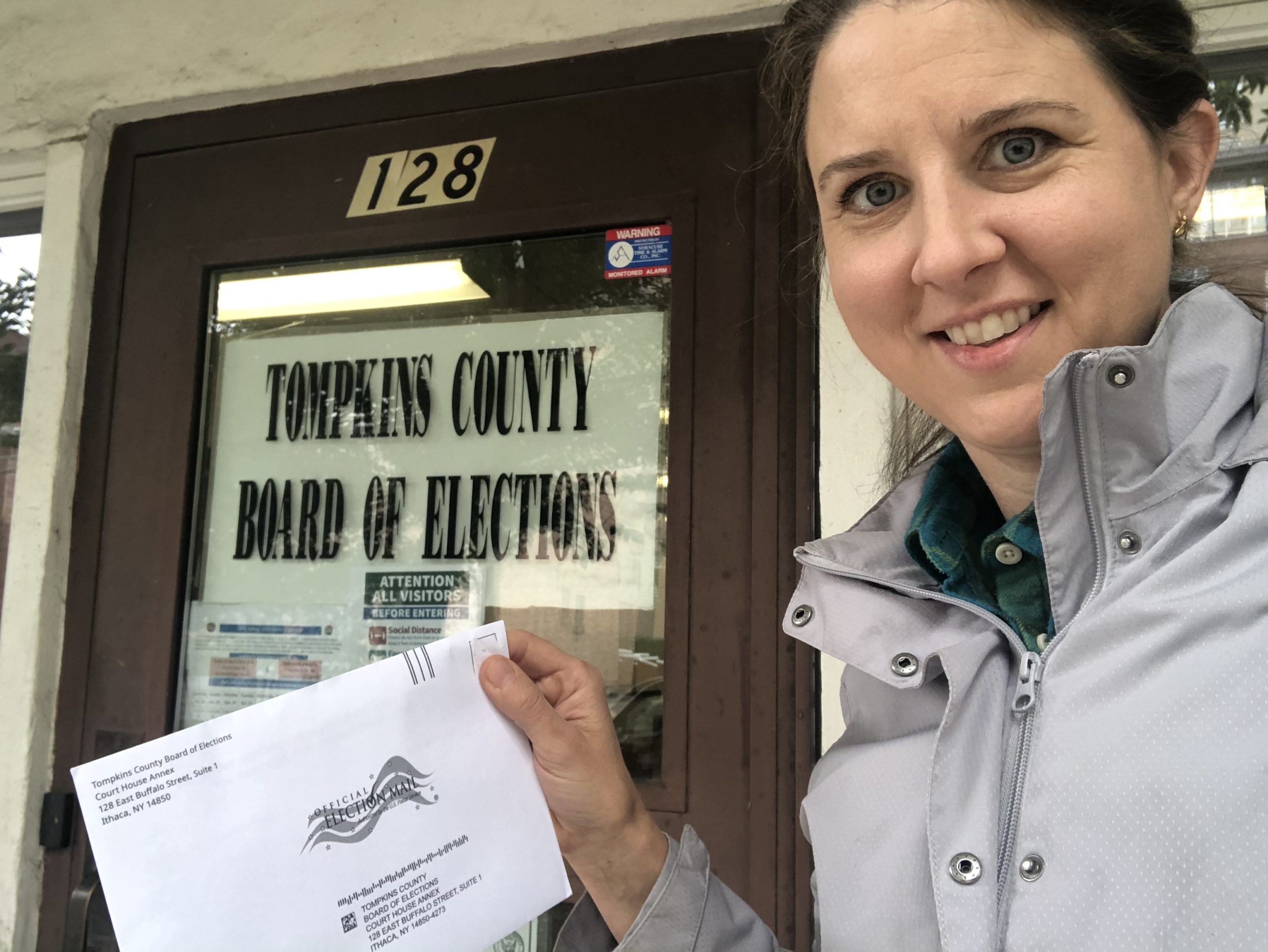At the Alliance for Science, we believe that everyone should make their voices heard and participate in democracy. With team members spread throughout the country and others based internationally, those of us who are United States citizens have various plans for voting in the Nov. 3 election. Below, a few of us share our personal voting plan. Have you made yours yet? If not, please visit vote.org to check your registration status and the voting rules that apply to your state.

Sarah Evanega: Voting early, in-person
At my house, voting is a family affair, involving all three of my young kids—even if it means arriving late to school. It’s important to me to instill the significance of voting in each of my children so that they will be active, voting citizens throughout their adult lives. This year, we have an early in-person voting option in Ithaca, New York, where we live. We even have the opportunity to do it on the weekend — so no need to miss school! In New York, the early voting period runs from Saturday, Oct. 24, 2020 to Sunday, Nov. 1, 2020. Our plan is to walk the short 3 ½ blocks to the Town of Ithaca Courthouse and participate as in-person voters. We’ll be wearing our masks and will be proud to take part in this important part of our American democracy. Afterwards, we’ll have a picnic in Seneca Falls, NY, which shares the shores of Lake Cayuga with Ithaca and is cited by many as the birthplace of the US women’s suffrage movement. That’s significant to us because 2020 is the centennial anniversary of the formal adoption of the 19th Amendment into the US Constitution. One-hundred years later, may we as a nation continue to fight for the right of all Americans to have easy voting access to ensure that their ballots are cast and counted.

Vanessa Greenlee: Dropped off absentee ballot
I registered online for New York State’s absentee option in September, selecting the “potential transmission of Covid-19” dropdown option as rationale. This past weekend, we received our ballots in the mail. I drove to the Tompkins County Board of Elections last week to deliver my ballot.
I chose personal delivery instead of sending via the US Postal Service because of the delays and uncertainties regarding the USPS in the news. I’m happy with my choice. There were two staff members in the elections office when I arrived, both wearing masks. The staff member asked me if I would like to see my cover envelope opened as he checked the ballot envelope for completion of signature and date. Everything checked out, and I saw my ballot placed in the ballot box. And I left with the customary “I voted” sticker to wear.
Joan Conrow: Voting by mail
I usually prefer to vote in person, but I didn’t want to overload the polls before or on Election Day. It’s very easy to vote by absentee ballot in New Mexico, where I live, so I’ll be casting my ballot by mail instead. I’ve also volunteered to be a poll monitor on Nov. 3. There’s some concern that people may try to disrupt voting at the polls. I don’t anticipate that happening in my community, but I agreed to be present and keep an eye on things. I figured my background as a journalist would be useful in providing accurate documentation of anything that seems questionable. It’s the first time I’ve ever done something like that. But I feel like we all have to vote and make sure that others aren’t prevented from exercising their legal right to participate in this very critical aspect of our fragile democracy.
Anna Garber Hammond: Voting early
I came to the United States in 2008, just before the first election of Barack Obama. At that time, I was just a visitor and witnessed the election as a spectator. I remember the energy during that time very well! That experience was new and unreal to me as a brand-new person in a very unfamiliar country and culture.
Four years later I was a green card holder, still unable to vote. Another four years later, I was just becoming a US citizen, so I couldn’t vote in the 2016 election, either. I did, however, attend my first Election Day party with friends and colleagues.
Soon I will be voting for the first time in the US election! I plan to vote early, to avoid crowds on Election Day.
Justin Cremer: Voting absentee from abroad
I’ve voted via absentee ballot since moving abroad in 2010 and will do so again this year. I’m registered to vote in Iowa, where I both grew up and later returned to for a five-year stretch as an adult. The last time I voted in person was the 2008 election. As an Iowan, you get unprecedented access to candidates because of the state’s first-in-the-nation status and I’ll never forget the atmosphere that surrounded the 2008 rallies I attended, nor the night when the caucus results were announced and shocked the world.
Although I miss being in the US (not just at election time, but all the time), I still taking voting very seriously. Luckily, it is very easy and straightforward to vote in Iowa as an overseas citizen. I did have a minor complication this year because my parents moved for the first time in nearly 25 years. Because their home serves as my official US address, I had to file a new ballot request even though I had already received one. The Polk County election officials were super helpful and a new correct ballot (my new US address is in a different statehouse district) quickly arrived via email. Iowa rules allow overseas citizens to vote electronically, so once I have researched the down-ballot and local candidates, I will return my ballot via email.
Nassib Mugwanya: A Ugandan’s perspective
I had not been following the US election that much until recently, when almost every news source I listen to is talking about it. All the political experts and friends I’ve listened to seem to suggest that this is probably one of the most important elections the US has had in recent times. One of my friends who will be graduating next year told me that she is going to vote because she thinks the economy has been greatly disrupted by the pandemic, and she wants a president who would steer it back to normal for her to have a job when she’s done. As an international student from Uganda studying at North Carolina State University, this election is equally important to me, because how America votes has a direct impact on higher education policies — especially for non-citizens. As an international student, you want an administration whose policies would not constantly make you feel like you can be put on the plane to go back home any time in the middle of your studies without completing your program.
